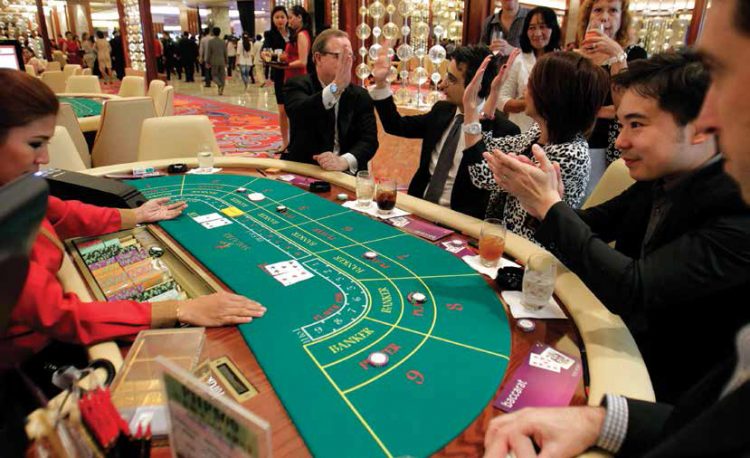In 17 months at Solaire Resort & Casino, Thomas Arasi has boosted performance and expanded the resort’s footprint. With a beautiful property and an exemplary service culture, not to mention a new crowd-pulling neighbor just down the street, he says Solaire is ready to play at the global level
When Thomas Arasi joined Solaire Resort & Casino in October 2013 the US$750 million property was struggling and its billionaire owner, Philippine ports tycoon Enrique Razon Jr, was disappointed. A month earlier, Mr Razon had fired William Weidner’s Global Gaming Asset Management as Solaire’s operator after the property posted a mediocre financial performance in its initial six months, even though most observers had heralded the first destination casino to open at Manila’s Entertainment City as a gamechanger for the Philippines.
Appointed Solaire’s president and COO and given a seat on the board of PSX-listed parent Bloomberry Resorts, Mr Arasi was charged with improving gaming revenue and profitability as well as overseeing a US$500 million expansion, the first phase of which opened at the end of 2014.
Having managed the completion and opening of Las Vegas Sands’ hugely profitable Marina Bay Sands in Singapore, he seemed like the right man for the job.
So far, so good.
Solaire’s new Sky Tower opened in November and again upped the ante for the Manila market. On the financial side, in the third quarter, gross gaming revenue grew 58% year on year, net revenue increased 42%, EBITDA tripled and Bloomberry’s earnings per share rose nearly sixfold while expenses were essentially flat.
Entertainment City has since welcomed its second megaresort, Melco Crown Entertainment’s City of Dreams Manila. It was against this backdrop that Inside Asian Gaming sat down recently with Mr Arasi in one of Solaire’s super-luxury Bayfront Villas to talk about Solaire and Entertainment City and their rapidly evolving place in the Asian—and global—gaming landscape.
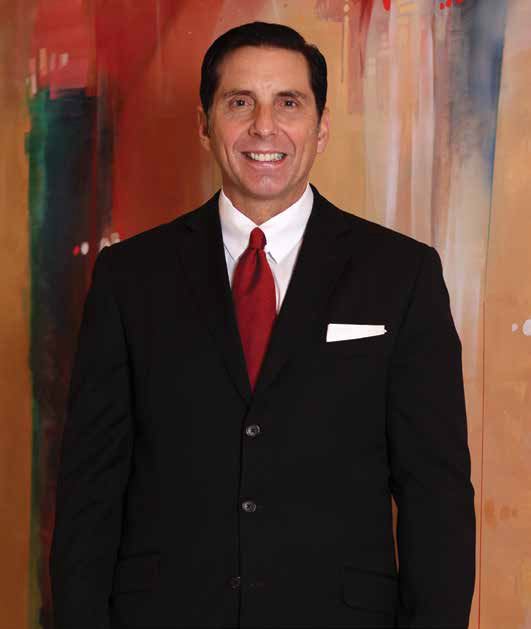
IAG: You’ve been at Solaire now for 16 months. What was going right when you arrived?
Mr Arasi: We have a fantastic property here that puts us in a competitive position with any integrated resort in the world, both in terms of its facilities, quality level and experience. The other thing is that I believe we have the best service people, the best team members, I’ve ever worked with. That was a strong asset right out of the box.
What needed improvement?
There were a number of things we had to do that related to the operational execution and that was related to many of the operating departments. The organizational structures needed to be repositioned. We had a major recruitment effort to reposition how we were going to operate going forward and that is on the marketing side, that is on the operational side, that is in almost every aspect of the operation. Of course, we had to get the revenue up to the right level, and we had to run the business in a way so that when revenue came in, a much higher percentage of that would flow through to the profit line.
How about working with Bloomberry Chairman Enrique Razon Jr?
Mr Razon is a very active chairman, and he is the chief executive officer. It won’t surprise you that he is supremely smart, a very, very quick study. He’s very decisive. But what you see in how he operates every day and in the direction that he gives, he’s very attuned to driving shareholder value, and he has an incredible sense of what works and doesn’t work. He has had that incredible sense not only in the ports business but in other businesses. You can see that touch now in the integrated resort business.
And how has it been working with Pagcor [Philippine Amusement and Gaming Corporation], the casino regulator?
Pagcor has a strong commercial awareness. Because they’re an owner and operator I believe it makes them an effective regulator. They understand the business thoroughly. And they understand this business in the Philippines context. Clearly, Pagcor understands the potential of the business because this Entertainment City is really being driven by them.
What about working in Manila?
I think the Philippines and Manila is the best quote-unquote people place that there is. It’s something that I’ve come to know as “famous Filipino hospitality”. That’s our secret sauce here, Filipino hospitality, how they respond to the guest in a high-touch, very personalized, very genuine, very warm sense that is very, very distinct.
What is Solaire’s VIP/mass mix at this stage? Is it where you want it to be?
We somewhat have casino nirvana. What I mean by that is we are very nicely balanced between mass and VIP. It’s a little bit more VIP than mass, but it’s a relatively small difference. That’s a good position to bein. The mass, of course, gives you a good foundational commercial environment, and the VIP allows you to incrementally add on top of the good, solid, profitable mass business, so we can participate in both. The other thing that you have here is because we’re diversified pretty well in our foreign business, having it not almost completely come from China. Here it comes from a multiple of countries, and we still have a substantial contribution from China. We get business from Malaysia, from Thailand, from Singapore, from Indonesia, from Korea, from Japan, as well as a nice big chunk from China. We do have a robust domestic market here. It’s a domestic market that is not yet at the level of Singapore or Macau, but it’s healthy. It’s a growing economy, it’s a growingpopulation, it’s a domestic market that is increasing its ability to have discretionary spending, which helps both gaming and non-gaming revenue.
What do you have to do to make the market grow and perhaps reduce reliance on domestic players?
We truly don’t need to see it as an either/ or situation. The single biggest thing that I wake up every day and think about is the growing Asia-Pacific gaming wallet. And that’s simply coming on the back of growing economies, prospering economies, all within a very reasonable flight to the Philippines, to Manila.
It’s really a question of positioning ourselves as a strong choice, as one of the prime destinations for the growing Asia- Pacific gaming wallet. We think that with the quality of our property, with the service experience that we can provide, with our very frequent, healthy lift—not even 90 minutes from Hong Kong into Manila—we feel that we ought to be well-positioned to participate in that Asia-Pacific growth.
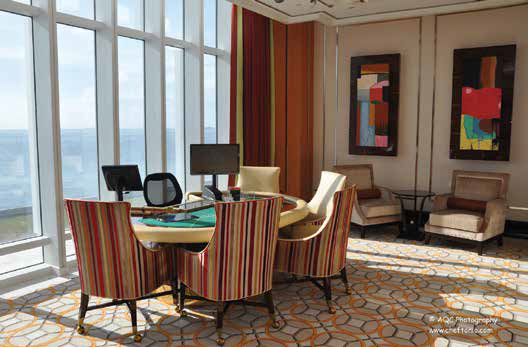
The Philippines’ low gaming tax rate offers advantages, particularly with junket commissions. How is Solaire leveraging that advantage?
We have set ourselves the goal—and I think we’re well on the way—of not only positioning ourselves as the top property in the Philippines but in the top echelon of global integrated resorts. I truly believe that our product and our service and, ultimately, our location, are going to make us one of the standouts globally. When people think, “Where do I go for the best VIP experience?”—and that’s a combination of the gaming experience and the time that I’m away from the table—I think Solaire has got the global credentials. We have incredible stickiness, if you will. When VIPs try us, we have a high probability of getting them back for a second and third visit because of what we can offer. That’s the product and the service.
You have to have the product and the service, but certainly the commercial backdrop is important, the tax rates, the prevailing commission structure and commission rates. All those things position the Philippines quite well. We’ve got a very competitive tax structure. We’ve got a competitive commission rate structure. We also have an ability to deliver service and build a product at a lower cost than other major gaming destinations. Let me give you a couple of examples: One, we’re looking to expand in other jurisdictions, and we used a consultancy’s information to do a broad estimate of what it would cost to produce the Solaire that you see in three areas—in Japan, in Macau, in Singapore— just as data points. In those three markets, it ranged anywhere from two-and-a-half to more than three times the cost to replicate what you have here in Solaire. Not to make light of a billion dollars, but a billion dollars goes a long way in the Philippines when it comes to developing an integrated resort physically.
And then if you look at the payroll compensation figures, we are a relatively small fraction for compensation costs compared to other parts of Asia. The Philippines is definitely not the least expensive compensation environment in Asia-Pacific, but I believe, currently, it’s the least expensive of those that allow major integrated resorts. Why is that important? For example, if I look to open a table, I have a more attainable—read, lower—cost of table gaming staffing to open that table than would be the case if I were in Singapore.
So coming all the way back to that VIP experience—and some of these things also translate into mass experience and mass marketing capability—the Philippines, I believe, is quite well-positioned.
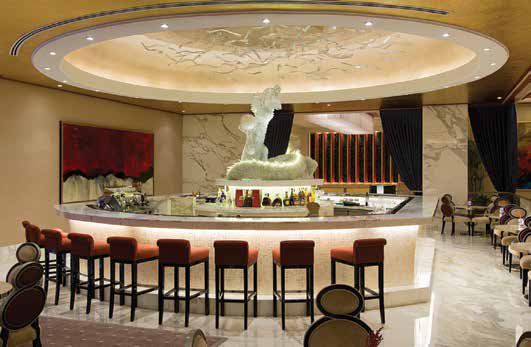
Where are your VIP players coming from? How has that changed with the opening of Sky Tower?
The single biggest source, but by no means anywhere near where it is in Macau, of any particular foreign country, is China. So we’re encouraged that after a year and a half or so of existence we already have very good participation and good traction in the China market. And we expect in the future that can grow.
We have 50 to 60 junkets that we’re currently doing business with, and we expect that to continue to grow. But we also have quite a nice component of what we call premium direct. There are no junkets involved in that business. That is good for us and that is also growing. But certainly at Solaire there’s a place for both. There’s a place for VIPs, there’s a place for premium direct.
You mentioned Sky Tower. We did almost double our number of private gaming rooms for VIPs there, and we have increased our table count in VIP in Sky Tower by about 60%. How can you almost double the rooms but increase table count by 60%? The reason is we started out here with several quite large VIP areas in Bay Tower. In Sky Tower, we went for increased flexibility with a number of smaller gaming salons. We’ve taken the lessons learned in Phase 1, and we made this programming change to handle the increase in both the junket and the premium direct. You know, the premium direct, where we get some very large players, they want a smaller place. Sometimes they’ll play two or even three tables by themselves—it’s just a matter of how they like to game—and we’ve found those smaller salons really help us.
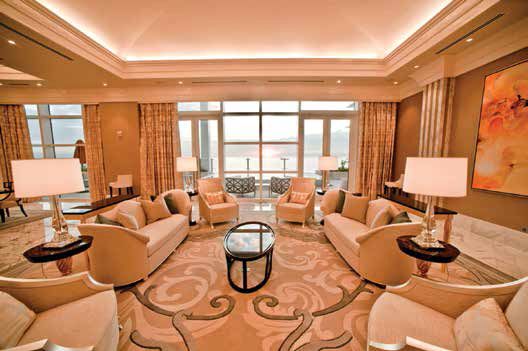
In light of the slump Macau is experiencing currently in VIP play, have some of the VIPs who are staying away from Macau been coming to Solaire?
The biggest story of 2014 for us was the organic growth of our marketing in China. There’s been a lot of talk about the slump in Macau, and clearly there is a slump in Macau. But Solaire has been organically growing its China business, really, since the end of 2013, and that really started taking off in the first quarter of ‘14.
We have the wind at our back to a degree. What’s really driving the organic growth is that the Chinese themselves, as an outbound market, both gaming and non-gaming, they’re just becoming more intrepid. They’re becoming more discerning. They’re becoming more adventurous. They’re more proactively choosing their destinations. They’re not necessarily going where the original Chinese travelers went. They know the global landscape, particularly the people who come to these integrated resorts, who have that kind of purchasing power. They’re getting a lot more sophisticated. So they can demand more choices. We set about starting late last year and early this year in an organic growth story. And you can see it in each one of our quarterly results this year. The slump in Macau, I think that may have added a little to the growth story, but for us the big story has been the organic growth story.
Conventional wisdom says that it’s difficult to get Chinese players, especially VIPs, to come to the Philippines, What has Solaire done to overcome that?
There’s some truth to that. One of our biggest challenges is the geopolitical situation between China and the Philippines and some of the negative publicity that has gone over there. I can tell you that being from the United States, I feel safer here in Manila than I do, I’m sorry to say, in many cities in the United States.
There’s no doubt that the Philippines has had some challenges in its overseas perception. However, the gaming business is very much a relationship business. As we’ve been building out our marketing infrastructure and our marketing organization and our offices, we’ve been adding team members to Solaire who have relationships with existing players. Our team members have been able to express with great confidence to their customers— and these are people who really trust our team members, they’ve had relationships for a long time and they often know each other personally as well as in the gaming host/patron relationship—“Come to Manila, come to Solaire. I just moved here, don’t worry, you’re going to have a great experience here.” And we have incredible stickiness once people get here.
The challenge is to continue to chip away at the PR static on the line that we’ve had, and the opportunity has been when people come and experience Solaire, we almost always get them back. And they tell their friends. So we’re actually looking to capitalize on word of mouth. We have a lot of players who come here, sometimes the more intrepid ones, and literally within 30 minutes of being here they’re texting or WeChatting their friends: “Look, you’ve got to check this out, you’ve got to come down here. Let’s make another trip. You’re going to love it here.”
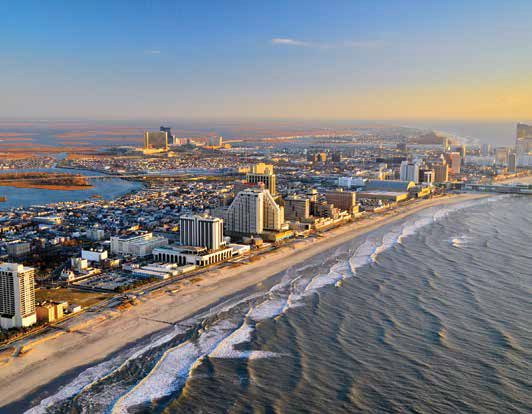
Both major Manila players—Solaire and Resorts World Manila—are experiencing sizable increases in promotional costs and trade receivables, suggesting intensified competition and perhaps indicating a market approaching its limit. From Solaire’s perspective, is this analysis accurate?
The proof is in the pudding. Based on net revenue, and these are published, publicly released figures, our EBITDA margin in the fourth quarter of 2013 was 18%. Our EBITDA margin in the third quarter of 2014 was 42%. So it’s more than doubled. That’s on a vastly higher revenue base, it’s not strictly through cost-cutting; it’s increasing revenue and margin flow-through. That’s the top-down way of looking at it.
Let’s talk about it when it comes to mass and VIP. In VIP, we have had just tremendous increases in revenue. The growth of VIP turnover and revenue is producing much, much more profit, absolute pesos in profit.
But on a margin basis, the VIP business is a lower-margin business. But, as we often say, profit margin doesn’t pay debt service and dividends, pesos do or dollars do. So while the VIP business has grown dramatically, [even though] it’s a lower-margin business, it has still been wildly good for our financial performance. The commission structure, the private jets, the staying in villas like this, that’s all part of promotional expense.
Now let’s talk about mass, which is also a contributor on a smaller scale to the promotional expense percentage. We are also getting a much higher level of mass player. We are really starting to penetrate that premium-mass market. Mass also has its reinvestment program, a loyalty program. In the case of Solaire, it’s SRC, Solaire Rewards Club. The more the mass customer plays and the higher level they play at and the more money we make, we actually reinvest in them more, but we [also] reinvest in them proportionately more. So marginal profitability goes down, although absolute profits go way up. So, hopefully, that makes the point how we can be dramatically increasing revenue and absolute profits and overall EBITDA margin going way up—I mean 18% to 42%—while at the same time that one discrete line item for promotional expense as a percentage is also going up. That’s just how the math flows out.
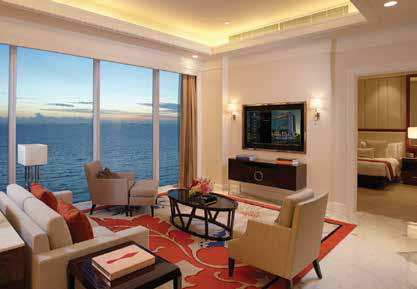
Is there still room for growth in this market?
Most definitely.
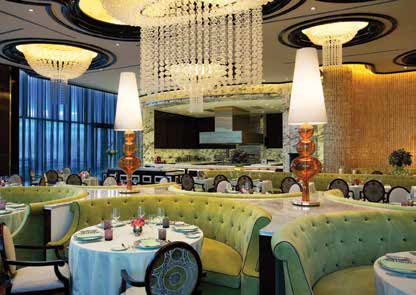
Is there room for the other resorts in Entertainment City? Does this promotional increase give you any pause about that?
No, it does not. Again, it’s the total equation. City of Dreams has just opened. They’ve got a nice property, they’re good operators. Honestly, we welcome them. Why do we welcome them? Right now, even though Solaire is doing as well as it has, we are just out here by ourselves. Entertainment City was designed as a district. It was designed as a virtuous cluster of integrated resorts. That’s where we have to go. Entertainment City is becoming a true IR district. What makes a good IR district? It’s the Cotai Strip, it’s the Las Vegas Strip, in its heyday it was Atlantic City. Having multiple integrated resorts in close proximity to each other is a good thing. People want to try different things. Players take great comfort, whether they’re VIP or mass customers, in having multiple casinos to go play at. Sometimes they’re lucky and they win. Other times, they’re unlucky, the house wins. When they’re unlucky, one of things that they will sometimes do, they will just go to the other guy’s casino to play. And in doing that you get a nice rotation. We’re really missing that right now.
The other thing that really happens [is] to have a lot more non-gaming amenities. We’re building more non-gaming amenities. We just opened it with Sky Tower. CoD [City of Dreams Manila] is going to bring nongaming amenities. Those things, of course, help the non-gaming customer, but they also help the gaming customer.
Also, there is a tremendous amount of entertainment and activity, both gaming as well as non-gaming, throughout not only the Metro Manila area but also the entire Philippines. Until recently, when Solaire was the only property here, it was a tougher challenge than it’s going to be now with CoD open, and three, four, five years from now, with at least two more integrated resorts open in Entertainment City. That gravitational pull down here is going to become much stronger, and the ballast if you will, the center of entertainment in the Philippines, is going to be right here in Entertainment City.
And, if we’re going to get competitors, I sort of like some of the guys that are coming in. CoD, no question, they’ll have some really good pull in from China. [Universal Entertainment Chairman Kazuo Okada’s] Manila Bay Resorts, they ought to be strong in northern Asia, Japan and Korea. So from a long-term perspective, I’m very willing to deal with the inevitable short-term competitive pressure by making this one of the awesome critical masses. When you think about it, the [other] critical masses are going to be Macau and the Las Vegas Strip.
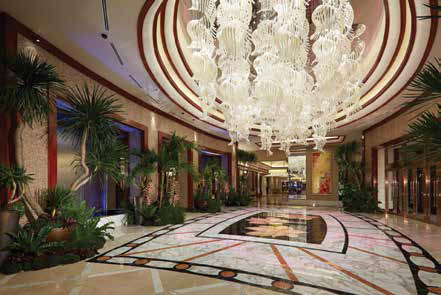
What will make people choose Solaire, not just over Philippine competitors, but convince them to choose Manila instead of Phnom Penh or Ho Tram or Singapore?
If you want a place where the property itself is a destination, I think that’s our main calling card. The beauty of our surroundings, the lavishness, the über-quality. You know, once you step inside Solaire, it’s that expression, you’re living large. It’s transformational. Whatever adjective you want to put to it: aspirational, living the fantasy, having an enveloping luxury experience. It’s living outside of the confines of your daily life, even for someone that’s of very substantial means.
You walk into that Sky Tower lobby, and how often do you see something like that? How often do you see the waterfall and the greenery and, on the one hand, the serenity that is right there in the Sky Tower lobby, and walk another 30 or 40 meters and you’re there on the hopping casino floor? I think that distinction between the two is going to be a very nice juxtaposition for us. So if you want the frenetic environment on the gaming floor, you can do that. But if you really want to chill and enjoy and de-stress and detox, there are plenty of other places in Solaire where you can go.
Solaire designed Sky Tower with bigger rooms rather than more of them. What does that say about how you want to position the product?
It speaks loudly. We want to enhance what we think is our positioning as the No. 1 experience in the Philippines. But in strong terms I’d like to express to you that we do not define ourselves in purely a Philippine context. It’s not, absolutely not, where the vision starts and stops. The vision is a global position in the top echelon of available global IR experiences. That’s absolutely how we’re positioning ourselves. I think you see that in everything we’ve produced here. The customer is becoming increasingly global, has increasing choices, and that is a crowd that moves around, and we want to make sure we’re well-positioned for it.
Editor at large Muhammad Cohen also blogs for Forbes on gaming throughout Asia and wrote Hong Kong On Air, a novel set during the 1997 handover about TV news, love, betrayal, high finance and cheap lingerie.






